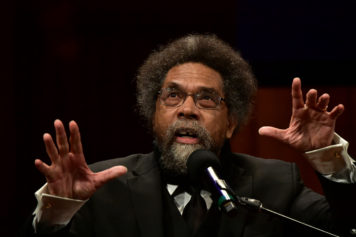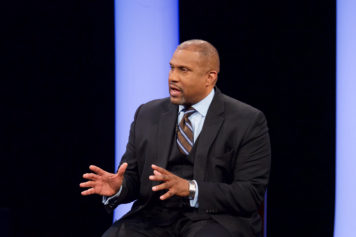With “America I Am: The African American Imprint” making its home in Charlotte, N.C., while 35,000 visitors descend on the city for the Democratic National Convention in September, Tavis Smiley is sending a message. “It’s important for Americans to understand that there is a 400- to 500-year backstory to Barack Obama,” the radio and TV host told The Root.“He didn’t just fall out of the heavens.”
From June 30 through Jan. 1, 2013, the exhibit’s more than 200 artifacts, which trace the contributions of African Americans to the history and culture of this country, will fill the Harvey B. Gantt Center for African-American Arts + Culture. The museum is named for the history-making first black mayor of Charlotte, an architect and community leader who has advised the second, and current, African-American mayor, Anthony Foxx, as he prepares to host the convention.
Author and advocate Smiley shepherded the exhibit through its creation and four-year tour. When he spoke with The Root recently, Smiley and professor and author Cornel West had wrapped up their poverty-awareness tour, during which they talked about the challenges and possible solutions explored in their book, The Rich and the Rest of Us: A Poverty Manifesto.
Though the two have taken heat for their criticism of President Obama, Smiley said that it’s in keeping with “the best of our black prophetic tradition, which in my mind means speaking truth to power and to the powerless.” Smiley talked with The Root about why it’s important for the shapers of democracy in both parties to consider the exhibit and its message about America’s obligation to all of its citizens.
With “America I Am: The African American Imprint” making its home in Charlotte, N.C., while 35,000 visitors descend on the city for the Democratic National Convention in September, Tavis Smiley is sending a message. “It’s important for Americans to understand that there is a 400- to 500-year backstory to Barack Obama,” the radio and TV host told The Root.“He didn’t just fall out of the heavens.”
From June 30 through Jan. 1, 2013, the exhibit’s more than 200 artifacts, which trace the contributions of African Americans to the history and culture of this country, will fill the Harvey B. Gantt Center for African-American Arts + Culture. The museum is named for the history-making first black mayor of Charlotte, an architect and community leader who has advised the second, and current, African-American mayor, Anthony Foxx, as he prepares to host the convention.
Author and advocate Smiley shepherded the exhibit through its creation and four-year tour. When he spoke with The Root recently, Smiley and professor and author Cornel West had wrapped up their poverty-awareness tour, during which they talked about the challenges and possible solutions explored in their book, The Rich and the Rest of Us: A Poverty Manifesto.
Though the two have taken heat for their criticism of President Obama, Smiley said that it’s in keeping with “the best of our black prophetic tradition, which in my mind means speaking truth to power and to the powerless.” Smiley talked with The Root about why it’s important for the shapers of democracy in both parties to consider the exhibit and its message about America’s obligation to all of its citizens.
TS: “The Doors of No Return” [from Ghana]. These are the doors that our ancestors were marched through in shackles and chains in Africa when they were stolen from their lands and sold into slavery. Millions perished in that Middle Passage; only the strongest survived. To stand in between those doors that our ancestors walked through for the last time, those doors of no return are very powerful … Prince’s guitar . I called him when I was working on this a few years ago … People run to that guitar.
TR: How does this exhibit fit in with the planned Smithsonian National Museum of African American History and Culture?
TS: One thing I’m disappointed about — and we have 300 items from all over the world, so I have nothing to be complaining about; and the Smithsonian, to its credit, did loan us an executive to get this exhibit curated — but the Smithsonian did not make any effort to loan us any items … The funny part about that story is everything always comes full circle. Now that we’re down to the last year of our exhibit touring, the Smithsonian has been very, very aggressive in going to the lenders [and] begging them to donate these items to the new museum.
TR: What action can get done in the present partisan atmosphere, especially concerning the issue of poverty?
TS: It is polarized already, and that’s where, again, our timing of being in Charlotte with this exhibit during the Democratic National Convention was by design, and putting out [The Rich and the Rest of Us] was by design. This issue must be a priority; Mr. Obama and Mr. Romney have to focus in on it …
In the last presidential race between Obama and [John] McCain, in those final three presidential debates, the word “poor” or “poverty” didn’t come up one time. Obama never raised it. McCain never raised it. The moderators never asked about it. Fast-forward four years: Half of the nation is wrestling with poverty. We can’t abide another race for the White House where this issue is never discussed.
Source: The Root


